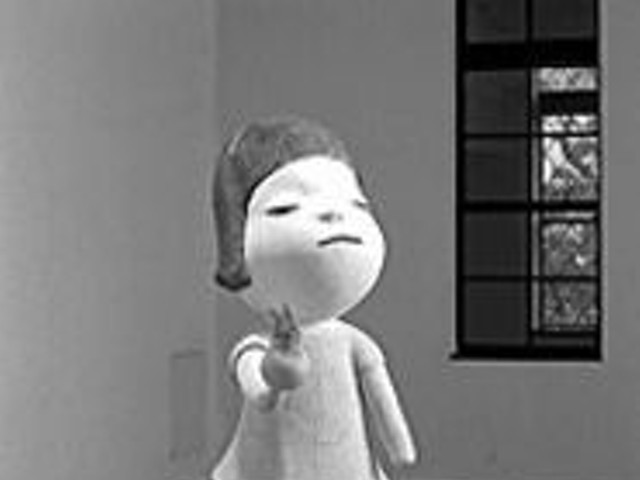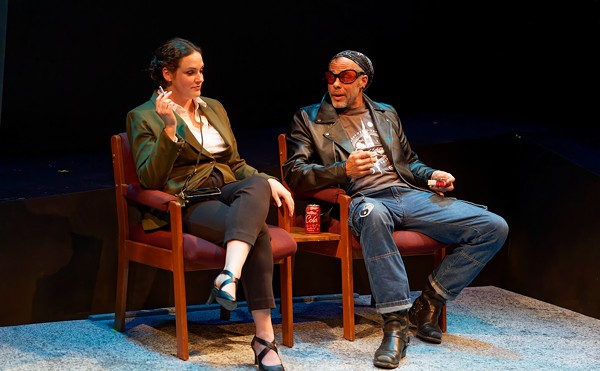Fontbonne University's production of the 2001 off-Broadway musical hit Bat Boy will be unlike any other Bat Boy produced thus far in the United States. Why? Because this Bat Boy will mark the first time that songs written for the recent London production have been performed in America. For this we can thank Michael Crawford.
But before Crawford enters the story, let's go back to 1989, when Doug Storm had an epiphany in the top row of the Fox Theatre. No, not a nosebleed; a real epiphany. Storm had grown up in St. Louis County, performing as a child actor at the Muny and Westport Playhouse. But performing didn't mean all that much; he took his talent for granted. "Then I saw Les Misérables at the Fox," he recalls. "Then and there, I knew I had to be in that show." Three years later, as a member of the St. Louis Symphony Chorus, Storm sang at Carnegie Hall in Carmina Burana. But the high point of that New York trip was seeing Les Miz on Broadway. When it was time to return to St. Louis, Storm pleaded with his parents to be allowed to remain in the Big Apple.
"I didn't have any direction in my life at that point," he says. "But I was so moved by Les Miz, I wanted to use my voice to touch people in that great story of redemption." Storm's parents made him return to St. Louis. But one month later, as his Christmas gift, they moved him to New York: "The message was, 'We believe in you; go get it.'" And he did. Eighteen months later he joined the national touring company of Les Miz in Charlotte, North Carolina. "My folks were there," he recalls. "For me it felt like graduation. I had started college early, so I never finished high school. Then because I floundered around in college, I didn't graduate there either. But that first night in Les Miz was a feeling of accomplishment, as if I had done my parents proud."
Three years and umpteen cities later, he moved on from Les Miz. "I never got bored doing it," Storm says, "but eventually I did get bored being on the road. It was really heartbreaking to reach the point where something I loved so much had become a grind."
After Les Miz, Storm did not lack for work. He spent a year on Broadway in The Scarlet Pimpernel, sang backup to Linda Eder. He also was a charter member of Bat Boy. He was there for the original workshops and back for the off-Broadway opening. Bat Boy was on the verge of becoming a breakout hit when it instead became a casualty of the September 11 disaster.
Last year's participation in the Broadway flop Dance of the Vampires was a less creative experience. "If you ever want to watch people burn $16 million, bill by bill, that's the show for you," he says. "Michael Crawford had so much creative control. During rehearsals someone would come onstage and deliver a funny line, and the next day that line would have been added to Crawford's role." The musical only ran eight weeks, but that was long enough for the 36-year-old Storm to begin thinking about coming home. Not only was the work unfulfilling, but he has a daughter in St. Louis and is now enjoying a rekindled courtship from fifteen years ago. After lots of commuting, last fall he made the move official.
Not long after returning home, Storm heard about the Fontbonne production. After meeting with the student cast, he contacted good friend Laurence O'Keefe and asked the Bat Boy composer to allow the students to perform O'Keefe's new London songs. O'Keefe quickly agreed. So it is that this weekend, thanks to Doug Storm's initiative and generosity, Fontbonne will become a part of the ongoing Bat Boy mutation.
Meanwhile, on Saturday night a more immediate homecoming will occur when Willy Holtzman attends the New Jewish Theatre production of his play Hearts. Not only was Holtzman born and raised in St. Louis, but much of this Pulitzer Prize-nominated drama is set here.
Born in 1951, Holtzman grew up in Olivette and attended Ladue High School. Though he always wanted to write, playwriting came late. Twenty years ago, while living in New York, he became friendly with Cheryl Crawford, one of the co-founders of The Actors Studio and producer of such Broadway hits as Brigadoon and Paint Your Wagon. "She decided I was going to be a playwright," Holtzman says during a conversation from his home in Wilton, Connecticut. "What a miracle of a mentor. She threw me into a writers' group at The Actors Studio. Talk about learning to swim in the shark tank! I learned a tremendous amount, but it was not a nurturing environment, to put it mildly."
But New Dramatists, a writers' organization just three doors east of The Actors Studio, was. "Cheryl got me started and New Dramatists sustained me," Holtzman says. During the past decade his plays have been produced in regional theaters around the nation. In the late 1990s, Hearts, a dramatized rendering of his father's military service during the final year of World War II, began to gestate. "Once I conned my dad into giving me permission to write the story," Holtzman says, "we had an active correspondence by e-mail. A lot of memories began to flood back into his mind. They had been lost because of the nature of the trauma. I began to ask myself: What have I opened up here? But my father is a tough guy. He said, 'No, no, this is all necessary.' When I wrote the scene about his electroshock therapy, again I thought, I can't do this. But he assured me, 'It has to be in the play.'"
Even more daunting was to try to capture his father's participation in the liberation of the concentration camp at Buchenwald: "Of all the risky things I went for, that was the riskiest, because his first impulse was to blame the victims. I've never seen that attitude dramatized. But I had to be honest, because it's part of the legacy of guilt and trauma that he took forward from that experience.
"To describe World War II as 'the good war,' as Studs Terkel did, or to praise those young soldiers as 'the greatest generation,' doesn't change things one bit. There is nothing sentimental about my father's experience of living with post-traumatic stress and not having any idea of what it was. If I had found myself sentimentalizing this story, I would have put the play aside."
When an early draft received the Arthur Miller Award for Dramatic Writing, Miller attended a staged reading at the University of Michigan. "He was great," Holtzman says. "He didn't get into detailed notes. He told me what was right, what was working. Then he said, 'You're ten minutes too long.' I said, 'Where?' He said, 'That's for you to figure out.'"
Now the play is receiving productions around the country. But this week's staging -- which Holtzman will attend with his father and mother and brother and sister -- is special. "This is homecoming," Holtzman says. "From the moment I started work on this play, all I ever wanted was for Hearts to be done in St. Louis. So now I get my wish."





